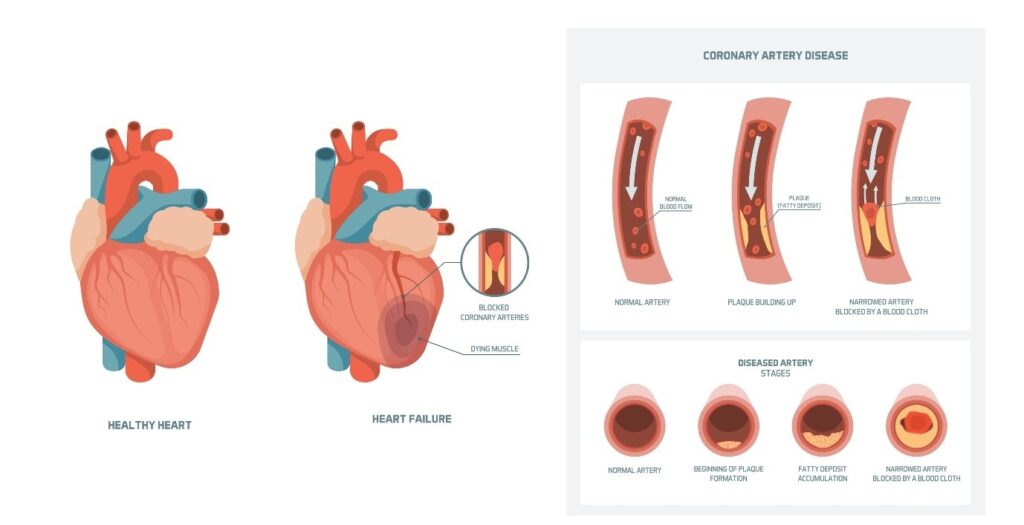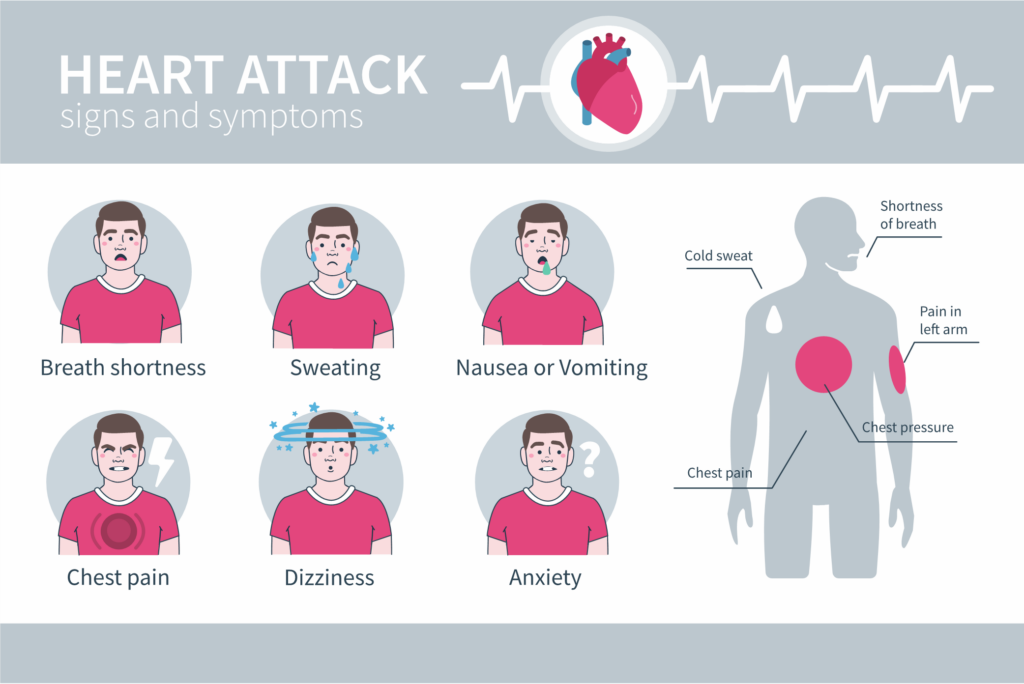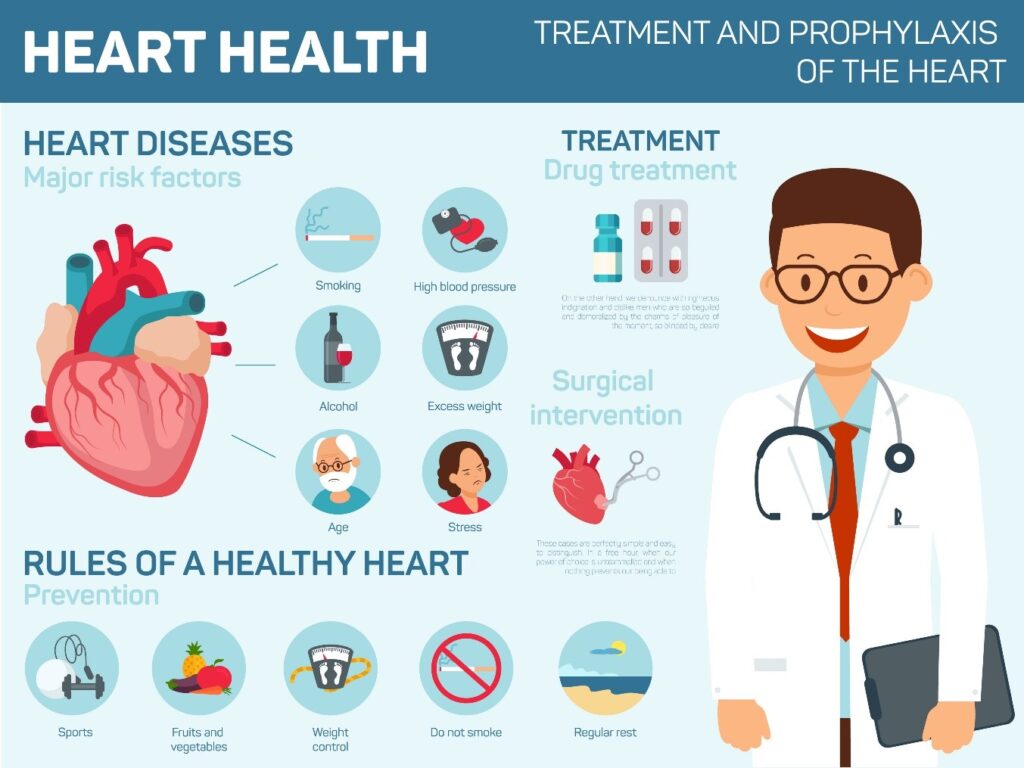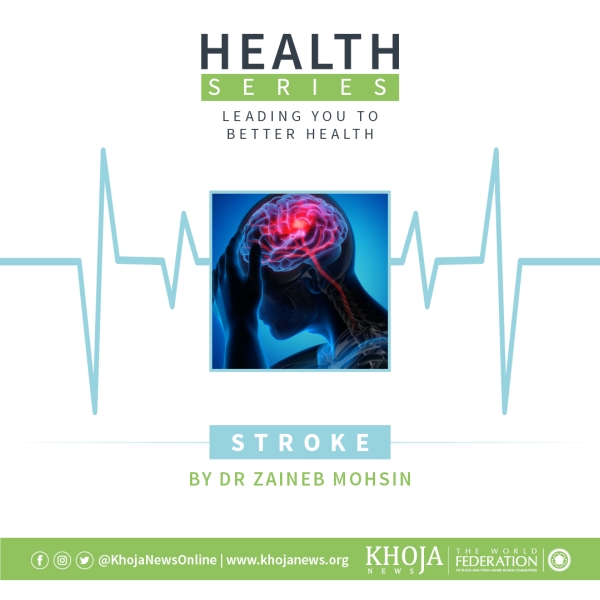What is coronary artery disease?
Coronary artery disease is a condition when the blood vessels that supply the heart become blocked by fatty material called a ‘plaque’. This prevents the heart from getting the oxygen and nutrients it needs from the blood. If the blockage is incomplete, then a person gets angina, which is chest pain during activity. If the blockage is complete, then a person suffers from a heart attack as a portion of the heart is not receiving any blood supply and so dies. Heart attacks result when a blood clot blocks an already narrow part of the coronary artery.

What are the risk factors for coronary artery disease?
Some of the risk factors for getting heart disease can be modified and some cannot be changed.
Risk factors that cannot be changed include:
- Age: The older you get, the greater your chance of getting heart disease. Men older than 45 and women who are post-menopausal are at greater risk of coronary artery disease.
- Sex: Males are more likely to get heart disease than females
- Ethnicity: Asian/African ancestry is more likely to be associated with coronary heart disease
- Family History: If you have a family history of heart disease, it puts you at greater risk of having heart problems
- High cholesterol: Some patients have genetic causes of a raised cholesterol called familial hypercholesterolemia that puts them at higher risk of developing heart disease. Also higher levels of Lipoprotein(a), homocysteine and fibrinogen leads to greater risk of developing heart disease.
Risk factors that can be modified include:
- Blood pressure: If you suffer from hypertension, then controlling your blood pressure will decrease your risk of having heart disease.
- Cholesterol: If you suffer from high cholesterol, lowering this will reduce your risk of having heart disease.
- Good glucose control: If you have diabetes, managing your glucose control can make a big difference in your risk of suffering from heart disease
- Being overweight: If you are overweight or obese, this puts a lot of pressure on your heart muscle. Losing weight can be very effective in reducing your cardiovascular risk. Weight loss also lowers blood pressure, cholesterol and improves diabetes control.
- Sedentary Lifestyle: Being inactive increases your risk of heart disease. Regular low level physical activity during the day or engaging in sport thrice a week will decrease your susceptibility to heart disease.
- Smoking: If you are smoker, giving up smoking can be one of the best actions you can take to drastically reduce your risk of suffering from heart disease. There are nicotine patches and specific tablets available that can reduce your craving for cigarettes.
How is heart disease diagnosed?
A doctor can perform a physical examination, take a thorough medical history, and order a number of tests to diagnose CHD. For example:
- Electrocardiogram: This records the electrical activity and rhythm of the heart.
- Holter monitor: This is a portable device that a person wears under their clothes for 2 days or more. It records all the electrical activity of the heart, including the heartbeat.
- Echocardiogram: This is an ultrasound scan that monitors the pumping heart. It uses sound waves to provide a video image.
- Stress test: This may involve the use of a treadmill or medication that stresses the heart in order to test how it functions when a person is active.
- Coronary catheterization: A specialist will inject dye through a catheter they have threaded through an artery, often in the leg or arm. The dye shows narrow spots or blockages on an X-ray.
- CT scans: These help the doctor visualize the arteries and detect calcium within fatty deposits which is a risk factor for heart attacks.
- Blood tests: Doctors can run these to measure blood cholesterol and blood glucose levels, especially in people at risk of high blood cholesterol levels.
What are the symptoms of coronary heart disease?
Symptoms of heart disease can differ between men and women and how severe the condition is. If there is partial blockage of the coronary artery, then there is chest discomfort or pain only on exertion for example on climbing the stairs or walking briskly. However, if there is a complete block of the coronary artery which usually occurs suddenly, it can lead to complaints of chest pain, discomfort, nausea, vomiting, shortness of breath and even collapse.

Usually patients who suffer from a heart attack have a history of angina, but severe heart attacks can happen without having angina and in some cases can lead to sudden death.
If you are with someone who you think is having a heart attack, it is important to call the ambulance as every minute you lose leads to more heart muscle dying.

What is the treatment of coronary heart disease?
The treatment of heart attack in the hospital involves either injection of a clot busting drug to open the blocked artery or carrying out an angioplasty which involves inserting a wire attached to a balloon, into the blocked artery through the artery in the leg to open the clot and then place a stent to keep it open.

Blood thinners and special blood pressure medications such as ACE inhibitors and Beta blockers are also used to manage a heart attack.
The next stage of treatment involves prescribing medication to prevent further heart attacks and this usually involves medications to reduce stickiness of the blood such as aspirin & clopidogrel, special blood pressure tablets and medications to lower cholesterol.
Patients who have severe heart disease may require bypass surgery. A surgeon will use a blood vessel from another part of the body to create a graft that bypasses the blocked artery. The graft may come from the leg, for example, or an inner chest wall artery.
How can coronary artery disease be prevented?
Coronary artery disease is mostly a lifestyle illness caused by poor eating habits, lack of exercise and excessive stress.
It is important to get your blood pressure, cholesterol and blood glucose checked annually by your doctor, especially after the age of 45, (although some individuals may need to be tested earlier) as you may feel alright even though you have abnormal results.

Managing the risk factors above and maintaining a healthy balanced lifestyle is important in preventing heart disease.
There are many things you can do to greatly decrease your risk of having a heart attack, arguably the most important being cleaning up your eating habits. Remember, it is never too late to start.
A Mediterranean diet with lots of healthy fruit and vegetables and olive oil with protein in the form of fish is a very effective way to prevent heart disease. The omega-3 in oily fish is an excellent way to lower your cholesterol and improve heart health.

Additionally, if the majority of your diet is plant based, it can reduce your risk of developing heart disease drastically as shown in research studies.


Authored by:
Dr Zaineb Mohsin
MBBch, MSc in Critical care (UK), MRCP(UK)
Qualified as a physician, trained in Endocrinology and Diabetes from Imperial NHS Trust and currently working as a research fellow in Metabolic bone disease at Oxford University













